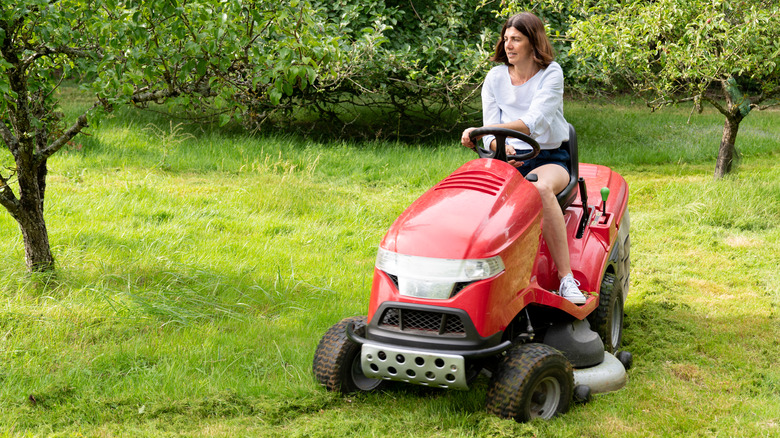As you mow the lawn for the fifth time this summer and blades of grass stick to your forehead, you may wonder why we put ourselves through all the trouble of lawn care! According to Planet Natural, lawns first originated around medieval castles in France and Britain. In those times, it was advantageous to have a lawn so that guards could easily see attackers approaching the castle, and aristocrats also enjoyed playing outdoor games like cricket and golf. Eventually, extravagant lawns became a status symbol and a way for noblemen to display their wealth. By the 18th century, the obsession with lawns had made its way to America, and even though most Americans don’t live in castles, we still place a lot of social value on our grass.
We value our lawns so much, in fact, that Pro Landscaper Magazine estimates we spend almost two months of our lifetime just mowing our lawns. How can you cut down on the time and effort you put into this sweaty chore? With the right lawnmower, of course! To determine which lawnmowers people say are most up to the task, House Digest conducted an exclusive survey — here are the results.
The riding mower reigns supreme

This answer may come as no surprise, but about 39.9% of people surveyed said that they prefer to use a riding lawnmower to keep their yards looking trim. Modern riding mowers have several benefits, including the ability to cut grass more quickly, cover large areas, and tow small trailers. One of the most obvious benefits, of course, is that you won’t have to shove your mower across the yard. Riding mowers allow you to take a seat and zip around your yard — an absolute necessity for people with a lot of acreage.
Of course, all of the benefits of a riding mower come at a price. Best of Machinery says you can expect to shell out at least $1,000 for a low-end riding lawnmower. More mid-range and premium mowers can even cost as much as $3,000, and the costs don’t stop there. A riding mower can burn almost half a gallon of gas for every hour of use, and the gas will need to be replaced somewhat frequently, or it will go bad from oxidation (via Cut Grass Pro). All in all, the riding mower is still a favorite for almost 40% of survey participants, but some people prefer to stick to more traditional mowing methods.
Alternative lawns and lawnmowers
The remaining 60.1% of survey-takers said they’d prefer to use some form of push mower, but they were divided about the specifics. Electric push mowers earned the most votes at 22.58%. Electric push mowers are great for people who prefer a more eco-friendly alternative, as they release fewer emissions and are much quieter than a standard gas mower. Electric push mowers were followed by self-propelled push mowers at 19.55%. Rounding out the survey, 12.88% said they preferred to use a gas-powered push mower, and only 5.09% chose a manual push mower. Push mowers, in general, are favored by people with small or oddly-shaped lawns because they allow you to cut tight corners and turn around more easily than a riding mower.
Today, many people are choosing to mow less often or go au natural with low-maintenance options like clover. A study published in the Journal of Applied Ecology showed that maintaining an intensely manicured lawn is actually quite terrible for the environment. Frequent mowing threatens plant diversity and takes away resources for pollinators, invertebrates, and herbivores. So next time your grass starts to look shaggy, saving the planet is the perfect excuse to relax and let it grow!